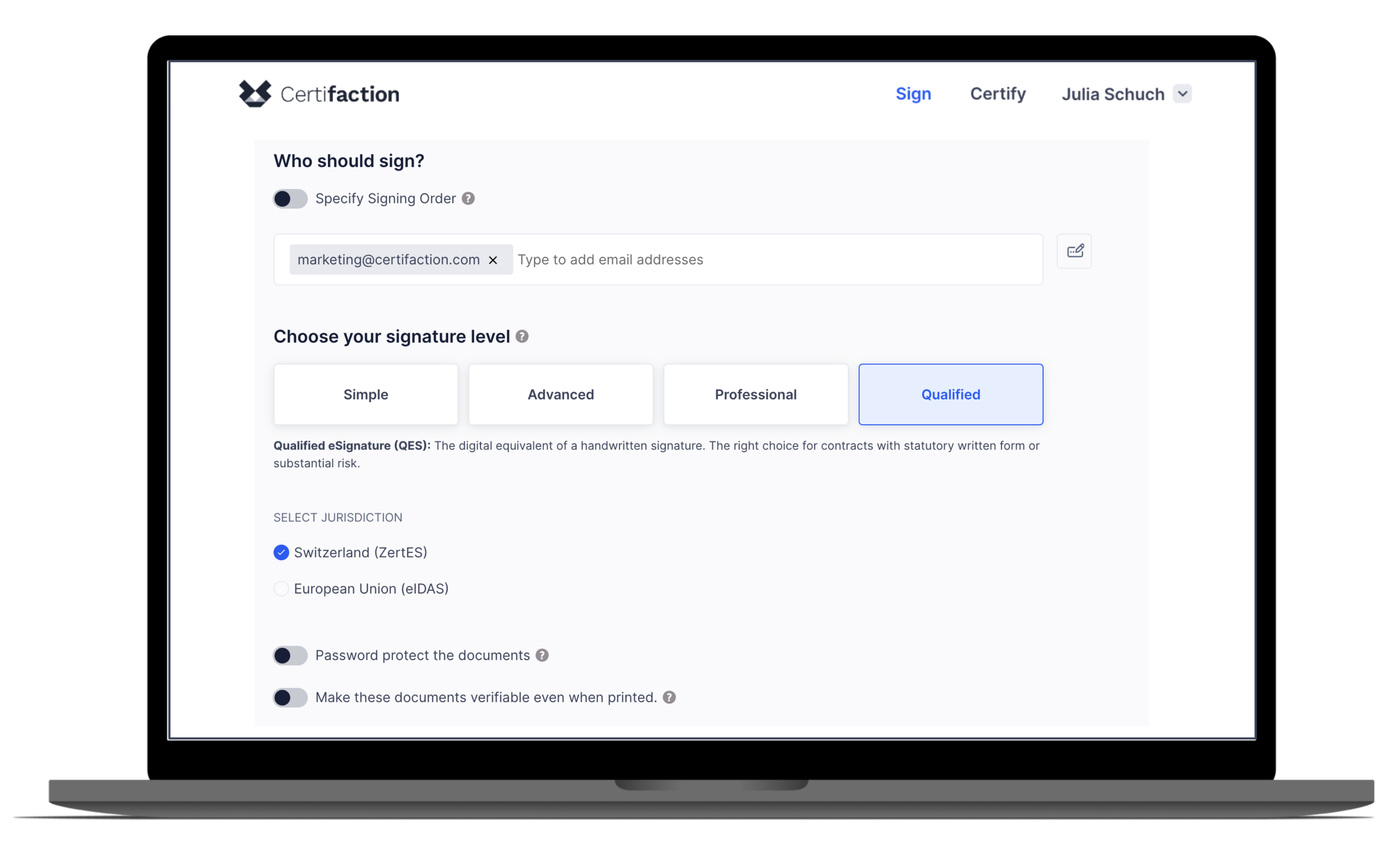Temporary work is an advantageous solution for overcoming the challenges of the volatile labor market. But what exactly does it mean to employ temporary workers? And what are the legal requirements for temporary employment contracts in Switzerland? We give you an overview of the advantages of temporary work, the legal situation and the possibilities of digital contract processing.
Definition: Temporary work
Temporary work is known by different terms depending on the country. In Switzerland, it is usually referred to as “Temporärarbeit” or staff leasing. The temporary employment agency can be called temp agency, temping agency, staffing agency, or similar. All terms refer to the same type of employment relationship: an employee is hired out by one employer (staffing agency) to another company (contracting company). This is often for a limited period, for example, 6 months or a year.
Advantages of temporary work
Temporary work enables companies to react flexibly to market requirements and cover short-term staff shortages. For example, seasonal vacancies can be filled, or a replacement for an employee on maternity leave can be hired. The contracting company’s HR department is relieved of a great deal of work, as the staffing agency takes over the search for employees as well as administrative tasks such as payroll accounting and social security registration. Nevertheless, the contracting company still has the right to issue instructions to the employee.
Another advantage: if the contracting company is convinced by the employee and has long-term requirements for the original temporary position, it can offer the employee the job as a permanent position. As the employee already has a lot of the necessary knowledge at this point, there is no risk of a bad hire. On the other hand, if it turns out that the employee does not fit in with the company, a statutory notice period of just a few days applies in some cases. Contracting companies are therefore much more flexible than with permanent positions.
What needs to be considered when drawing up temporary employment contracts?
In Switzerland, a temporary employment contract is usually concluded through a framework agreement between the staffing agency and the employee. This contract sets out the general conditions for all future work assignments, in particular the rights and obligations of the employee. In addition, a specific assignment contract (“Einsatzvertrag”) is concluded for each assignment, which regulates details such as the type of work to be performed, the start and duration of the assignment, working hours and location, and the hourly rate of pay. A surcharge for overtime may already be stipulated in the framework agreement.

Collective Bargaining Agreement (CBA)
- The Collective Bargaining Agreement (CBA) for staff leasing must be observed by all Swiss companies that hold a staff leasing license and whose main activity is staff leasing. Among other things, the CBA regulates minimum wages, wage supplements, and other employee entitlements.
- If a different CBA applies to the contracting company, this must generally also be observed.
Regulations on the termination of the employment relationship
- A fixed-term employment relationship ends automatically as soon as the contract term has expired. However, if the employment relationship is tacitly continued, it is considered to be for an indefinite period and the usual notice periods apply.
- A probationary period and early termination option are not provided for by law for temporary jobs but can be added by agreement.
- Contractual clauses that prevent the temporary worker from working directly for the contracting company after the end of the assignment and accepting a permanent position there are invalid.
Caution with chain employment contracts
- In Swiss case law, successive fixed-term employment contracts with the same content are referred to as “chain employment contracts” (“Kettenarbeitsverträge”). Such contracts may be considered inadmissible under certain circumstances, particularly if they are used to circumvent protective regulations.
- If it is determined that there are no objective reasons for chain employment contracts, an open-ended employment relationship is assumed. A repeated fixed-term employment relationship then effectively becomes a permanent employment relationship with a minimum duration, and all previously circumvented regulations such as notice periods or protection against dismissal apply.
- Regardless of whether objective reasons for the chain employment contracts can be presented, the following applies: legal consequences that are based on the length of service (such as continued payment of wages) relate to the total duration of all employment contracts.
Written form
Electronic contract conclusion
Instead of printing contracts, signing them by hand, and sending them by post, a staffing agency can also map this process digitally. This ensures greater efficiency and cost savings. eSignature solutions enable the identification of the future employee and the legally compliant signing of contracts. Digitally, 90% of contracts are signed within just 24 hours.
In Switzerland, the electronic conclusion of employment contracts is generally legally valid. While there is no formal requirement for permanent employment contracts, a qualified electronic signature (QES) must be used for staff leasing contracts, as this is the only form that complies with the written form requirement. Additionally, the so-called “qualified written form” is prescribed for framework agreements.
Requirements for the QES
The qualified electronic signature (QES) is the highest level of electronic signature and must meet strict requirements. In Switzerland, the QES is regulated by the Federal Act on Electronic Signatures (FAES, also referred to as ZertES), while the eIDAS Regulation is used in the EU. Only the ZertES- or eIDAS-compliant QES is equivalent to a handwritten signature.
The QES must contain a qualified electronic time stamp and be issued by a recognized provider of certification services. The so-called trust service provider identifies the signatory using an ID card or passport. In the past, this was usually done as a video identification procedure – innovative providers are now relying on the faster auto-ident procedure or NFC, which allows the passport chip to be easily read with a smartphone. This ensures the clear identification of the contractual partners and the integrity of the contract.
On the technical side, the so-called private key and public key procedures are used to create a QES. The trust service provider (TSP) generates and manages the key pairs, consisting of a private and a public key. It ensures that only the signatory has access to the private key. The public key is used to verify the authenticity of the signature.

Electronic signature with Certifaction
How to choose a provider for digital signatures
As an employer, you must protect contract data such as salary details and other sensitive information of your employees. Secure data transmission and storage is the only way to prevent misuse. Therefore, when choosing an eSigning provider, pay close attention to their processes, certifications, and regular security audits. User-friendliness and the software’s range of functions are also important decision-making criteria.
For an initial overview, we present the most important aspects of the providers DocuSign, Skribble, and Certifaction:
DocuSign
DocuSign offers comprehensive functions for contract management as well as AI-supported contract analyses. However, there are potential data protection risks with the US provider. The CLOUD Act could result in sensitive data being passed on to the US government. End-to-end data encryption is also not guaranteed.
Certifaction
The Swiss-based provider Certifaction focuses on privacy-first eSigning. You do not receive any contract management functions here. End-to-end encryption, local data processing, and the zero document knowledge principle (= when a document is processed, its content is not transmitted to the provider) ensure a high level of data security. Certifaction also relies on an intuitive QES process that takes just a few minutes and is easy to use, even for first-time users and digitally inexperienced signatories.
Skribble
Skribble also scores with a user-friendly interface and data storage in Switzerland. However, unlike Certifaction, Skribble does not offer local data processing and has access to all signed documents.
Conclusion
The flexibility and the ability to react quickly to changes in workload make temporary work an attractive model. As an employer, staffing agencies should be aware of the legal framework and proceed carefully when drawing up and signing employment contracts. In addition to specifications regarding the content of the contract, there are special features to consider in the area of digital signatures. Temporary employment contracts are only legally valid with a qualified electronic signature (QES).
DISCLAIMER: This article is for general information purposes only and is not intended as legal advice. We cannot guarantee the timeliness and accuracy of the information. If you have specific legal questions, please contact a licensed attorney in your area.



